📅 Sabato 24 maggio 2025 ore 10.30 – Lega Navale, Mola di Bari
Regione Puglia con Direzione Marittima di Bari, ASL Bari, ANCI Puglia e CIHEAM Bari presentano le Linee Guida tecnico-operative per pescaturismo e ittiturismo.
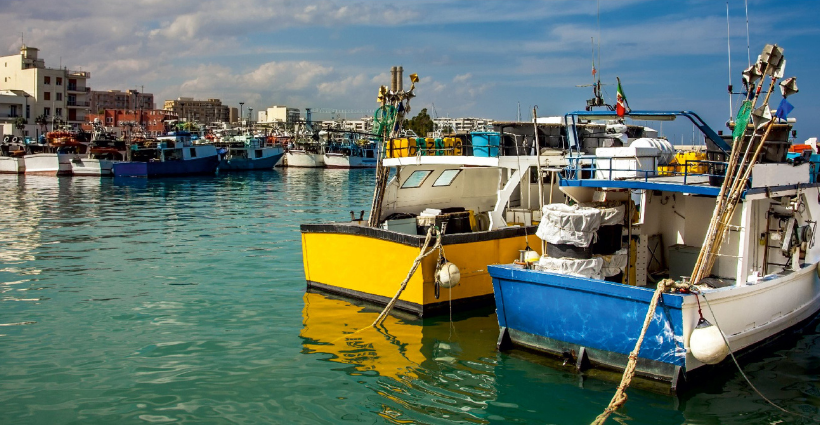
24 maggio alle 10.30, Lega Navale di Mola di Bari: Oltre la pesca: turismo, territorio e semplificazione, progetto PRO.PESCA.TUR.
Vivere il mare "dall’interno", attraverso gli occhi di chi lo solca ogni giorno e la cui anima si alimenta quotidianamente di bellezza e tradizioni, è quindi oggi possibile grazie alle pratiche di pescaturismo e ittiturismo. Queste forme di turismo esperienziale, sempre più diffuse, rappresentano un modo autentico e sostenibile per riscoprire la cultura marinara e la vita dei pescatori, valorizzando le tradizioni locali e promuovendo al contempo la tutela dell’ambiente marino.
In questo contesto, la Regione Puglia compie un passo decisivo con la pubblicazione delle Linee Guida tecnico-operative per l’avvio e l’esercizio delle attività di pescaturismo e ittiturismo in puglia: un documento innovativo, frutto del lavoro congiunto con la Direzione Marittima di Bari, della ASL Bari, di ANCI Puglia e delle principali associazioni di settore, e il coordinamento tecnico-scientifico del CIHEAM Bari. Si tratta del primo strumento organico a livello regionale che disciplina in modo chiaro l’accesso da parte degli operatori a queste attività, offrendo una base normativa, operativa e amministrativa solida.
Le Linee Guida rappresentano una novità assoluta: per la prima volta, gli operatori ittici dispongono di un vademecum completo che semplifica le procedure, aggiorna la modulistica, chiarisce i riferimenti normativi e definisce in modo puntuale i requisiti tecnici, le procedure amministrative e le norme igienico-sanitarie da rispettare. Un vantaggio concreto per chi intende avviare nuove attività o regolarizzare quelle esistenti, con la certezza di agire in conformità alle norme e con maggiore professionalità.
Tra le novità introdotte, si distingue anche l’istituzione di un Elenco regionale degli operatori autorizzati, uno strumento che garantirà trasparenza e tracciabilità, assicurando ai turisti un’esperienza autentica e sicura e agli operatori uno status riconosciuto e certificato, contribuendo alla qualificazione e alla credibilità dell’intero comparto.
Questo impianto normativo e gestionale non solo facilita il lavoro degli operatori, ma contribuisce in modo significativo alla crescita e alla strutturazione del settore in Puglia, trasformando la pesca in una risorsa multifunzionale capace di generare valore economico, culturale e ambientale. L’obiettivo è ambizioso: rafforzare l’identità dei territori costieri pugliesi e promuovere un modello integrato di sviluppo locale che renda il mare protagonista tutto l’anno.
All’incontro di sabato 24 maggio prenderanno parte rappresentanti delle istituzioni, delle amministrazioni locali, della sanità pubblica, insieme a esperti e operatori del settore.
Ad aprire i lavori sarà il sindaco di Mola di Bari, Giuseppe Colonna, che porterà i saluti di benvenuto ai presenti.
Nel corso dell’evento si parlerà dei risultati raggiunti dal Progetto PRO.PESCA.TUR e verranno presentate le Linee Guida tecnico-operative per l’avvio e la gestione delle attività di pescaturismo e ittiturismo in Puglia.
Interverranno sul tema Domenico Campanile, dirigente della Sezione regionale per la Gestione sostenibile e la tutela delle risorse forestali e naturali, Massimo Zuccaro, amministratore scientifico del settore Blue Economy del CIHEAM Bari, Marcello Luigi Notaro, Direzione Marittima di Bari, Luigi Fruscio, direttore generale della ASL di Bari, e Angelo Annese, sindaco di Monopoli e delegato ANCI per la Blue Economy.
Le conclusioni dell’incontro saranno affidate a Biagio Di Terlizzi, direttore aggiunto del CIHEAM Bari e all’assessore regionale Donato Pentassuglia.
Moderato dalla giornalista Enrica Simonetti, il workshop offrirà un confronto concreto su strumenti, buone pratiche e scenari futuri per un settore che può diventare motore della blue economy regionale. In questo processo, i pescatori pugliesi assumono un ruolo centrale: aprono le porte delle loro imbarcazioni e della loro vita quotidiana al pubblico, raccontando il mare come spazio di lavoro, cultura, sostenibilità e educazione ambientale.
In definitiva, queste Linee Guida non sono solo un documento tecnico, ma un vero catalizzatore di cambiamento che rafforzeranno l’immagine della Puglia nel mondo, come luogo autentico dove, tuttavia, mestieri tradizionali come quello del pescatore, sanno trasformarsi in figure moderne capaci di coniugare tradizione e innovazione, e contribuire a rendere il mare pugliese sempre più accessibile, vissuto e protetto.
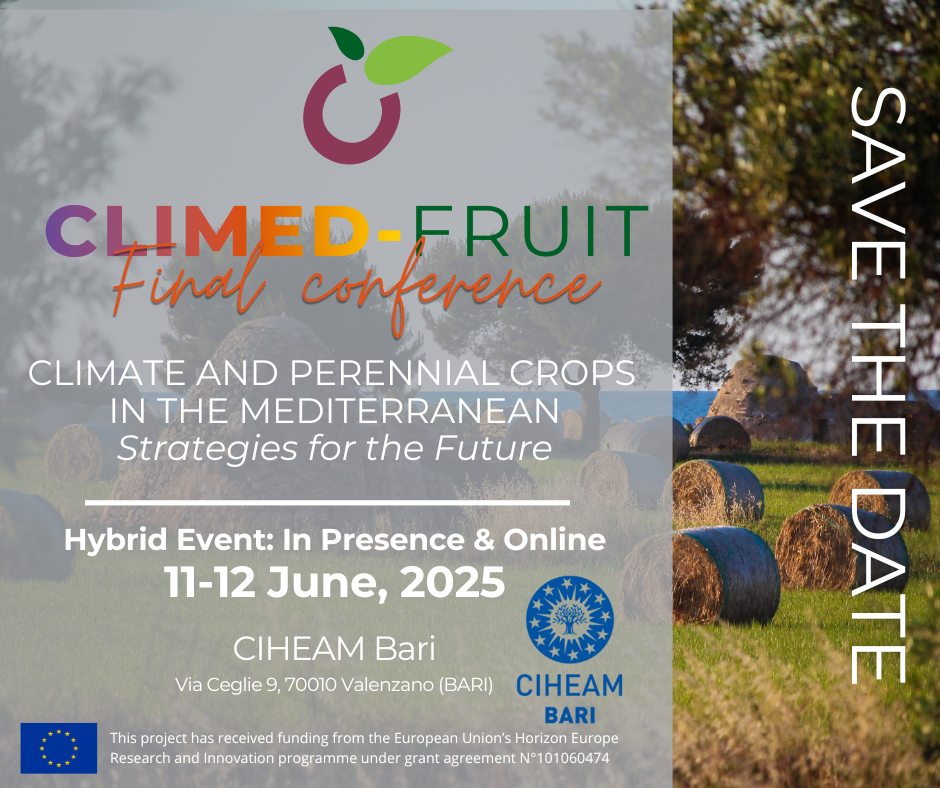
📍 June 11–12, 2025
CIHEAM Bari will host the final conference of the Climed-Fruit project, titled “Climate and Perennial Crops in the Mediterranean – Strategies for the Future”. The hybrid event is free to attend with mandatory registration for both in-person and online participants.
As climate change increasingly affects Mediterranean agriculture, the conference aims to spotlight innovative, field-tested strategies to build resilient and sustainable perennial cropping systems. Researchers, technical advisors, and pioneering farmers will come together to exchange knowledge and inspire action.
Thematic sessions on June 11 will address:
On June 12, participants will take part in a technical field visit to an innovative organic table grape farm in Ginosa Marina (Taranto Province), where they’ll explore:
The Climed-Fruit Conference is a unique opportunity to engage with international experts, discover practical solutions, and shape the future of agriculture in the Mediterranean.
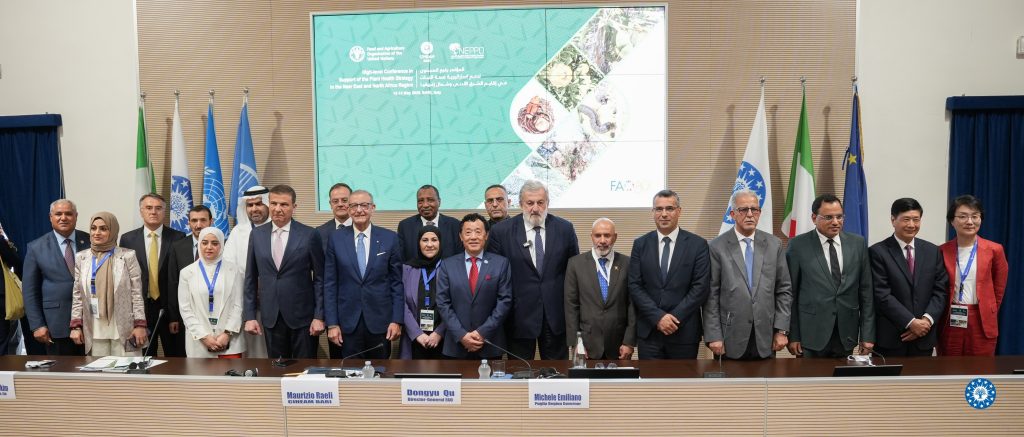
Si è conclusa oggi al CIHEAM Bari la conferenza di alto livello sul rafforzamento della Strategia Fitosanitaria della Regione NENA (Nord Africa e Vicino Oriente), organizzata in stretta collaborazione con la FAO e NEPPO (Organizzazione per la Protezione delle Piante del Vicino Oriente).
L’evento, svoltosi il 12 e 13 maggio, ha riunito Ministri dell’Agricoltura, rappresentanti di donatori internazionali e regionali, istituzioni tecniche e stakeholder provenienti da tutta la Regione per affrontare una delle sfide più urgenti per il futuro dell’agricoltura: le malattie e i parassiti transfrontalieri delle piante (TPPD).
I lavori si sono concentrati sulla promozione della strategia regionale per affrontare le TPPD, delineata nella "Dichiarazione di Bari” del 2023, puntando sul rafforzamento delle capacità, sul miglioramento delle pratiche fitosanitarie e sulla cooperazione transnazionale. Tra i principali risultati attesi: l’ottenimento di impegni finanziari concreti, la creazione di una rete regionale di cooperazione tecnica e l’elaborazione di una tabella di marcia operativa condivisa.
I parassiti alieni rappresentano una minaccia significativa per la sicurezza alimentare, il commercio e i mezzi di sussistenza. Si stima che ogni anno fino al 40% della produzione agricola mondiale vada persa a causa di parassiti e malattie delle piante, causando danni economici per oltre 220 miliardi di dollari all'anno.
Tali perdite sono particolarmente gravi nella Regione del Vicino Oriente e del Nord Africa, già vulnerabile agli impatti dei conflitti e della crisi climatica.
Il Nord-Ovest dell’Africa è attualmente colpito da un’invasione di cavallette del deserto provenienti dalla regione del Sahel. Un singolo sciame può coprire diverse centinaia di chilometri quadrati, e un singolo chilometro quadrato di sciame contiene fino a 80 milioni di adulti. Questi parassiti possono consumare in un giorno la stessa quantità di cibo di 35.000 persone.
La presenza di alto livello alla conferenza ha trasmesso un messaggio inequivocabile: la salute delle piante è essenziale per garantire la sicurezza alimentare e nutrizionale, promuovere lo sviluppo sostenibile e rafforzare la resilienza sia nella Regione NENA, sia a livello globale.
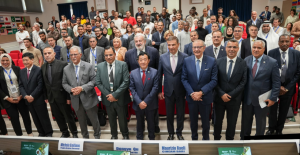
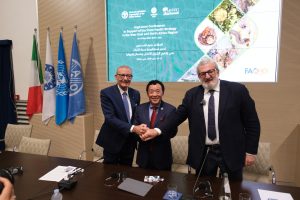
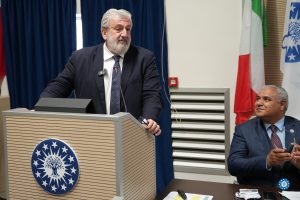
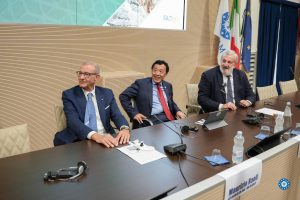
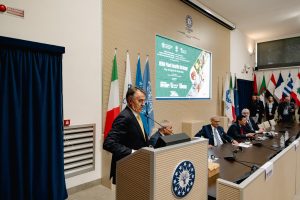
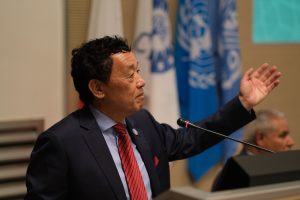
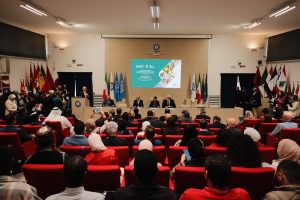
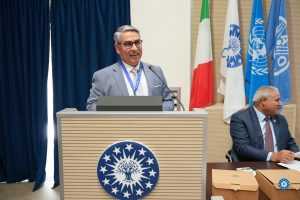
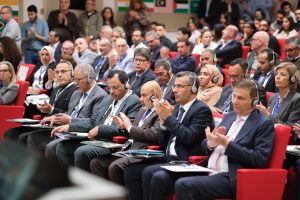
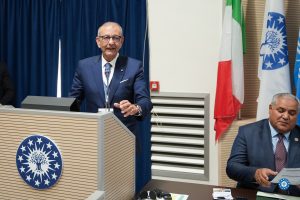
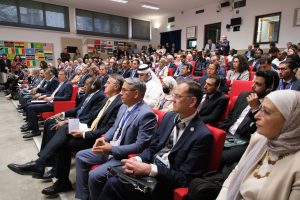
Il direttore generale della FAO, QU Dongyu, ha sottolineato che «nessun Paese può affrontare queste sfide da solo», aggiungendo che «la solidarietà e la cooperazione regionale e globale sono essenziali, i partenariati sono fondamentali e i finanziamenti sono indispensabili». Ha inoltre evidenziato che la protezione delle piante «è basilare per preservare la biodiversità, che è importantissima per la diversità alimentare e per garantire il diritto al cibo per tutti», ribadendo che «il diritto al cibo è un diritto umano fondamentale».
Nel suo intervento, il presidente della Regione Puglia, Michele Emiliano, ha evidenziato il valore strategico del CIHEAM Bari, che «rappresenta una visione strategica per la Puglia perché è multinazionale, consente il dialogo, ed è fondato sull'armonia, sulla pace e sull'approccio scientifico per le decisioni politiche, in questo caso in materia di agricoltura». Ha poi aggiunto: «Siamo felici di accogliere tutti in modo intelligente e razionale perché la collaborazione internazionale è fondamentale. La nostra è una terra di libertà ed accoglienza, che non distingue tra religioni e culture, ma è curiosa, felice ed orgogliosa di ospitare e conoscere le altre realtà. Questo Centro è il simbolo di quello che vorremmo essere come Puglia, cioè la casa dell'umanità, che consenta a tutti di sentirsi a proprio agio. Chiunque venga in Puglia, per qualsiasi ragione, è a casa sua». Emiliano ha inoltre ricordato l’esperienza della Regione Puglia nella gestione della Xylella fastidiosa: «Abbiamo accolto il Direttore Generale della FAO e abbiamo parlato di grandi pandemie fitopatologiche. L'esperienza della Regione Puglia è determinante per tutto il mondo: come nessuno, siamo riusciti ad organizzare un monitoraggio arboreo che permette di controllare milioni di piante, analizzando i campioni con le stesse tecniche con le quali esaminavamo i tamponi del Covid. Abbiamo una base dati di straordinaria importanza che siamo lieti di mettere a disposizione del CIHEAM Bari, così da estenderli come esperienza a tutti i Paesi del Mediterraneo».
Il direttore della sede italiana del CIHEAM, Maurizio Raeli, ha ricordato che «negli ultimi decenni, la crescente globalizzazione degli scambi commerciali e i cambiamenti climatici in atto hanno contribuito in maniera significativa all’introduzione e alla diffusione di organismi nocivi alieni o emergenti nei nostri territori». Citando l’esperienza della Xylella e altre emergenze fitosanitarie, Raeli ha sottolineato il ruolo strategico del CIHEAM Bari che, «da quasi quarant’anni, svolge un ruolo centrale nelle attività di formazione e rafforzamento delle capacità tecniche dei Paesi partner, in particolare della Regione NENA, grazie all’istituzione di un Master of Science dedicato alla Protezione delle Piante, avviato su iniziativa congiunta del nostro Centro, della FAO e dell’Università di Bari. Ad oggi, oltre mille esperti del settore sono stati formati presso il CIHEAM Bari, a conferma del ruolo strategico che la formazione continua riveste nella gestione delle emergenze fitosanitarie. La formazione e l’addestramento del personale -svolti sia in questa sede che all’estero- rappresentano un pilastro fondamentale di tutti i progetti di cooperazione tecnica nel settore fitosanitario, accanto al rafforzamento dei laboratori locali e al supporto nell’adeguamento normativo dei quadri legislativi nazionali». Ha infine ribadito che «la difesa delle piante non è solo una sfida tecnica, ma una responsabilità condivisa verso il nostro futuro».
Il CIHEAM Bari continuerà a essere un punto di riferimento per la cooperazione tecnico-scientifica nella regione NENA, promuovendo soluzioni sostenibili, rafforzando le capacità locali e facilitando il dialogo tra i Paesi del Mediterraneo.
L’impegno comune dei Paesi NENA e dei partner internazionali apre la strada a un futuro agricolo più resiliente, sicuro e sostenibile, in cui la salute delle piante è al centro delle politiche per la sicurezza alimentare e ambientale.
Durante la due giorni di lavori si è, anche, compiuta una visita tecnica nelle aree della Regione Puglia colpite dalla Xylella fastidiosa, con un sopralluogo sul campo tra gli oliveti della provincia di Brindisi. L’incontro ha rappresentato un’importante occasione di confronto tra esperti, agricoltori e rappresentanti delle istituzioni, finalizzata alla condivisione di osservazioni, esperienze e possibili strategie di gestione dell’emergenza fitosanitaria.
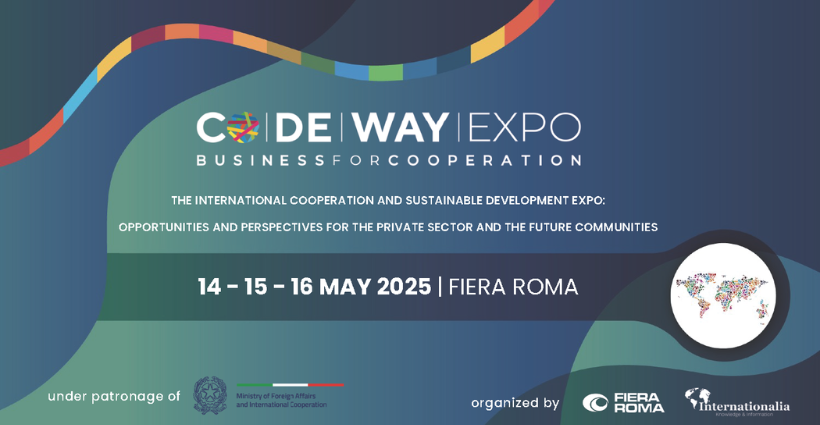
Dal 14 al 16 maggio 2025, la cooperazione internazionale torna protagonista a Roma con Codeway Expo, la fiera dedicata allo sviluppo sostenibile che riunisce attori pubblici, privati e istituzionali da tutto il mondo. Organizzata da Fiera Roma e Internationalia, sotto l’Alto Patrocinio del Parlamento Europeo e il Patrocinio del Ministero degli Affari Esteri e della Cooperazione Internazionale, la manifestazione rappresenta uno dei principali appuntamenti italiani per il confronto sui grandi temi del futuro: sicurezza alimentare, innovazione, ambiente, impresa e inclusione sociale.
Tra i protagonisti di questa edizione figura il CIHEAM Bari, centro di eccellenza internazionale attivo da oltre sessant’anni nella formazione post-universitaria, nella ricerca applicata, nella cooperazione allo sviluppo e nel trasferimento di conoscenza e innovazione. Promuovendo pratiche sostenibili e innovative nei Paesi del Mediterraneo e oltre, l’Istituto di Bari si conferma un attore strategico della diplomazia scientifica. All’edizione di quest’anno, il CIHEAM Bari contribuirà con due appuntamenti dedicati al rafforzamento dell’imprenditoria agricola e agroalimentare in Africa, allo scopo di favorire la collaborazione tra istituzioni e imprese italiane.
In programma per il 15 maggio il primo convegno internazionale, Cooperazione con il settore privato italiano per lo sviluppo di imprese agroalimentari in Africa, che avrà inizio alle ore 14.30 nella Hall 1. L’evento rappresenterà un momento di confronto multilaterale sui modelli di cooperazione internazionale che coinvolgono il settore privato italiano nel supporto a startup e microimprese in Africa. Il CIHEAM Bari presenterà le esperienze maturate nei progetti STARTUP10 e TANIT – TANdem Italia-Tunisia, due iniziative che valorizzano il trasferimento di conoscenze e tecnologie a sostegno della sicurezza alimentare e della crescita economica inclusiva.
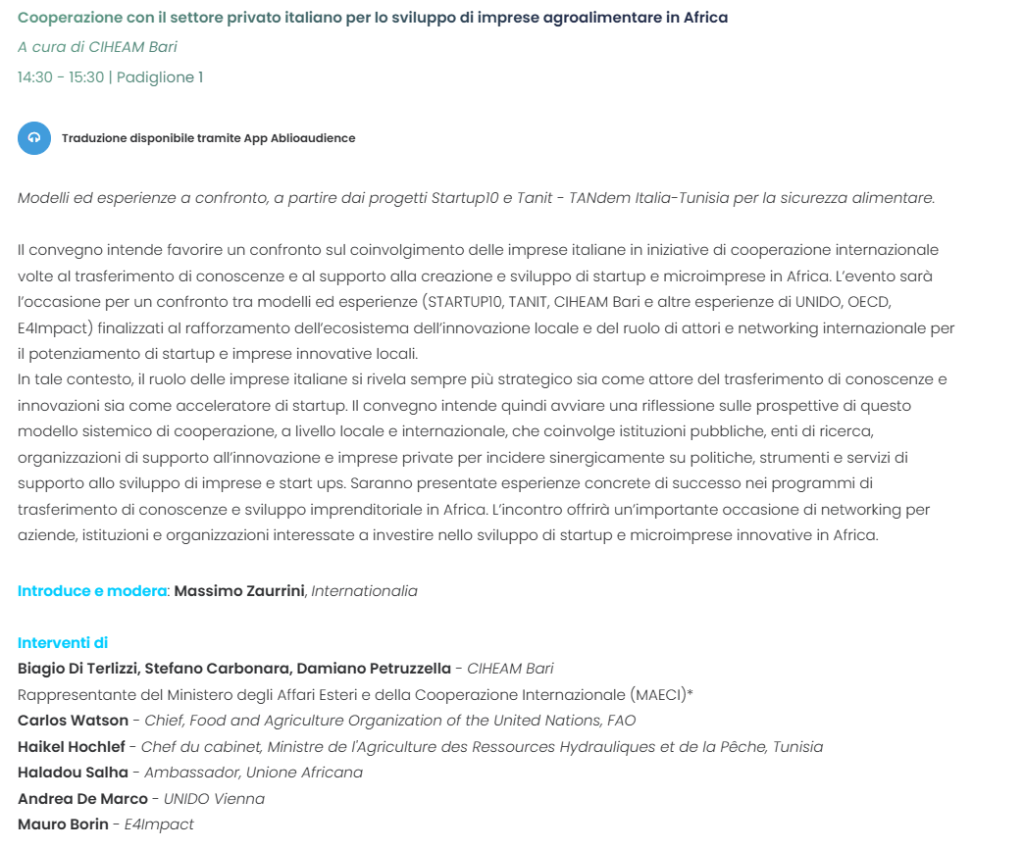
Tra i relatori previsti, Biagio Di Terlizzi, direttore aggiunto del CIHEAM Bari, Stefano Carbonara e Damiano Petruzzella del CIHEAM Bari, Carlos Watson, Chief, private sector unit, Food and Agriculture Organization of the United Nations (FAO), Haikel Hochlef, capo di gabinetto del Ministero dell’Agricoltura tunisino, Andrea De Marco, partnership advisor, Directorate of SDG Innovation and Economic Transformation UNIDO e Mauro Borin, E4Impact. L'incontro sarà moderato da Massimo Zaurrini, direttore di Internationalia.
Alle 15.30, nella sala 2 del padiglione 1, si terrà il workshop dedicato al Progetto TANIT–Cooperazione Italia-Tunisia: collaborazione con le imprese italiane. L'incontro, di carattere tecnico, è rivolto alle aziende italiane interessate a esplorare nuove opportunità di cooperazione e investimento in Tunisia, nell’ambito del Progetto TANIT, parte integrante del Piano Mattei per l’Africa. Durante l’evento verrà presentata una manifestazione di interesse rivolta al settore privato, finalizzata all’avvio di progetti congiunti di trasferimento tecnologico e innovazione nel comparto agroalimentare tunisino.
«Essere presenti a Codeway rappresenta per noi un tassello di una strategia integrata di cooperazione internazionale, in cui imprese, mondo della ricerca e istituzioni uniscono le forze per favorire lo sviluppo sostenibile e la sicurezza alimentare –dichiara Biagio Di Terlizzi, direttore aggiunto del CIHEAM Bari–. In Africa come nel Mediterraneo, promuovere imprese resilienti significa costruire stabilità e opportunità per le comunità locali».
Con oltre 50 eventi in tre giorni, incontri B2B, desk informativi con enti finanziatori e agenzie di cooperazione, Codeway Expo si conferma uno spazio di dialogo strategico per rafforzare la diplomazia economica italiana e il ruolo delle imprese nei mercati emergenti.
Sul sito https://www.codewayexpo.com/ il programma completo e la possibilità di iscriversi per partecipare gratuitamente.
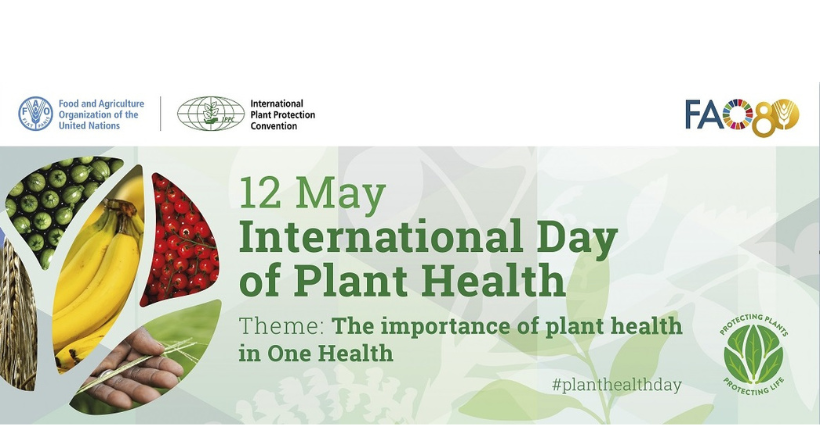
12 May marks International Plant Health Day (IDPH) worldwide, an important occasion to raise awareness on how plant health safeguards human, animal and environmental health.
This year's celebrations include a high-level hybrid event that will be held from 09:00 to 11:00 CST / 17:00 to 19:00 CEST (Rome time) in San Salvador, El Salvador, with FAO Director-General Qu Dongyu's keynote address, followed by keynote speeches and technical presentations by leading plant health professionals.
The event will also see the announcement of the winner of the EUPHRESCO III 2025 plant health video contest (a joint CIHEAM Bari, PBRI-Australia and CABI-International initiative), which promotes creativity and awareness on plant protection issues.
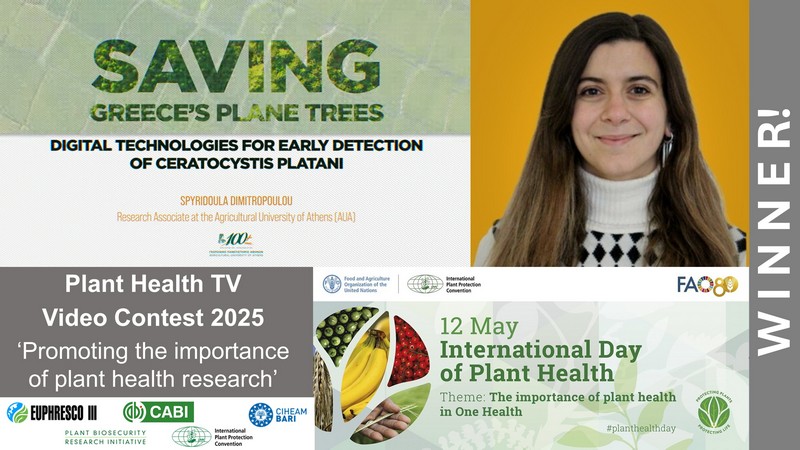
Spyrioula Dimitropoulou, Research Associate at the Agricultural University of Athens (AUA), is the winner of the Plant Health TV Video Contest 2025, organized by the FAO and the International Plant Protection Convention (IPPC). Her video, "Saving Greece’s Plane Trees: Digital Technologies for Early Detection of Ceratocystis platani", effectively highlights the vital role of plant health research, in line with the theme of the International Day of Plant Health, celebrated on 12 May. Congratulations to Spyrioula on this outstanding achievement!
FAO encourages everyone to participate by registering online and sharing their activities and celebrations, which will be presented in the IDPH Impact Report 2025.
This year's International Day of Plant Health also paves the way for an important upcoming event: the 17th International Congress of the Mediterranean Phytopathological Union (MPU), which will be hosted by CIHEAM in Bari, Italy from 6 to 10 July 2025. The Congress will bring together scientists, institutions and stakeholders from across the Mediterranean region to address emerging plant health challenges, promote sustainable agriculture and strengthen cooperation in the field of plant pathology and protection.
For more information, please visit the CIHEAM Bari webpage dedicated to the International Day of Plant Health and the MPU 2025 Congress webpage.
The Kick-off Meeting of the Erasmus BestHONEY Vocational Education Cooperation Project, in which CIHEAM Bari is a project partner, was held at the Eskişehir Directorate of Agriculture and Forestry on April 16–18, 2025.
Experienced professionals involved in project implementation participated as official delegates from Türkiye, France, Spain, and the Italian provinces of Bari (Valenzano) and Agrigento. The meeting was attended by two academicians from France, two veterinarians from Agrigento (Italy), two researchers from Valenzano (Italy), and two veterinarians from Spain.
CIHEAM Bari was represented by Dr. Nuray Baser, Project Manager of the BestHONEY initiative, and by Dr. Noureddin Driouech.
The project was formally inaugurated on the first day by Mr. Ender Muhammed Gümüş, the project owner and official representative of the hosting institution, with the participation of all partner organisations.
Following the opening session, field activities were conducted, including inspections at a beekeeping farm and a honey packaging facility.
During the office session, Dr. Nuray Baser from CIHEAM Bari delivered a presentation titled “Materials Used in Beekeeping and Their Properties,” while Dr. Noureddin Driouech introduced the CIHEAM Bari organization, its mission, and ongoing initiatives in sustainable agriculture. Throughout both the field and office activities, project participants actively exchanged their professional knowledge and practical experiences.
At the conclusion of the activities, participation certificates were awarded to international participants by the Provincial Director, Mr. Ender Muhammed Gümüş. The programme concluded with a closing speech, expressions of goodwill, and souvenir photographs.
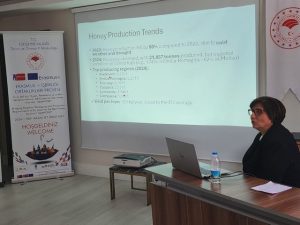
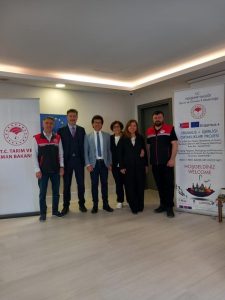
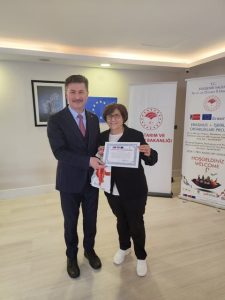
Significativa la presenza del CIHEAM Bari all’edizione 2025 di MACFRUT - Fruit & Veg Professional Show, inaugurata martedì 6 maggio al Rimini Expo Centre e in programma fino all’8. Sono 14 gli stand espositivi del Centro, dedicati ai propri interventi di cooperazione allo sviluppo nei settori dell’agricoltura sostenibile, della gestione delle risorse naturali e dell’innovazione rurale, ciascuno assegnato ad un progetto specifico, con l’obiettivo di valorizzare e condividere esperienze, tecnologie e risultati ottenuti sul campo. In questo contesto, il CIHEAM Bari svolge anche un ruolo di raccordo internazionale, facilitando la partecipazione di delegazioni ufficiali provenienti da Paesi dell’Africa e del Mediterraneo, composte da alti rappresentanti istituzionali e funzionari ministeriali.
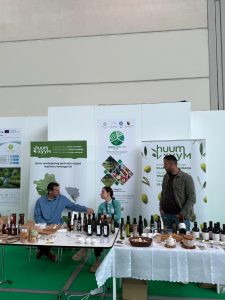
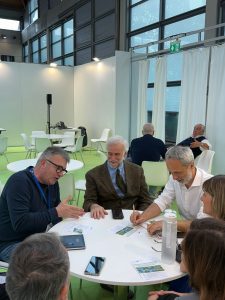
Durante le giornate di MACFRUT, il CIHEAM Bari presenta tre iniziative chiave: GECO 2.2 - Green Economy and CO₂.2, progetto finanziato dal Programma Interreg Italy-Croatia, che promuove pratiche agricole sostenibili, crediti di carbonio e tutela della biodiversità (italy-croatia.eu/web/geco22), Green&Healthy BiH, che sostiene una produzione agricola più verde e sana in Bosnia-Erzegovina, facilitando l’accesso ai mercati e STARTUP10, che promuove sicurezza alimentare e occupazione giovanile in 10 Paesi partner della cooperazione italiana, supportando startup e incubatori nell’ambito dell’economia verde e blu.
Mercoledì 7 maggio alle ore 11.00, Damiano Petruzzella, amministratore scientifico del CIHEAM Bari, parteciperà alla sessione Focus Egitto - Strengthening Egypt-Italy collaborations to drive innovation for sustainable rural development - Success stories, nell’ambito del convegno Agribusiness e ortofrutticolo: Sviluppo e partnership Italia-Africa - Focus Paesi Piano Mattei. L’evento è promosso da CDP - Cassa Depositi e Prestiti in collaborazione con MACFRUT, SIMEST, AICS, Confindustria Assafrica & Mediterraneo, E4Impact, CIHEAM Bari, The Alliance of Biodiversity International and CIAT, con il coinvolgimento del Ministero degli Affari Esteri e della Cooperazione Internazionale (MAECI). Durante la sessione è prevista anche la testimonianza dell’azienda egiziana EGROBOTS, partner del progetto STARTUP10.
L’evento sarà accessibile anche in diretta streaming, previa registrazione, cliccando sul seguente link.